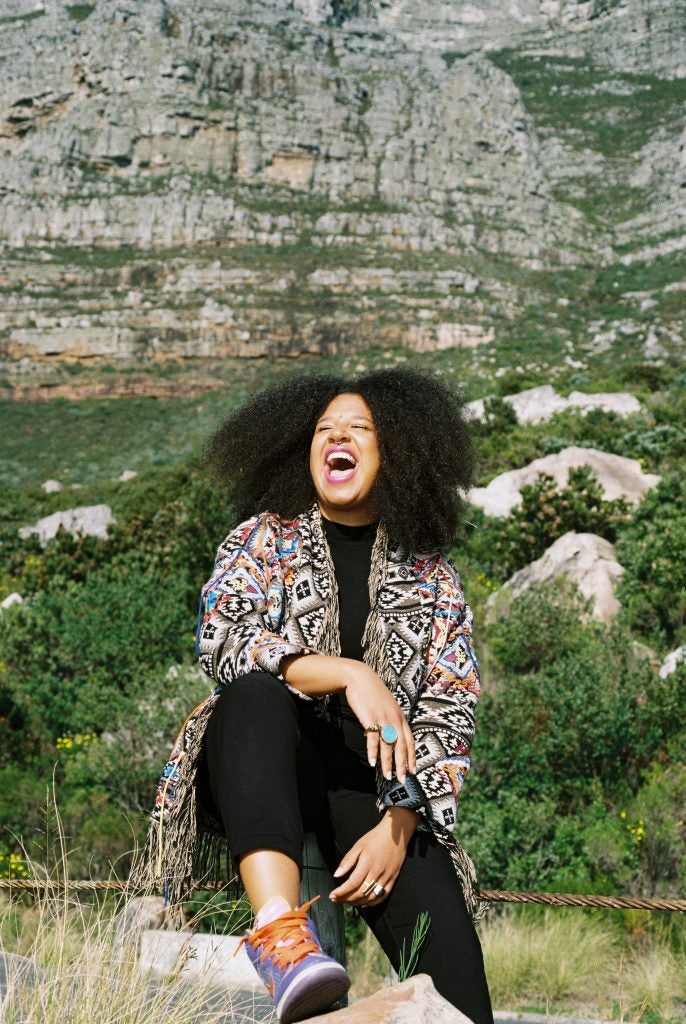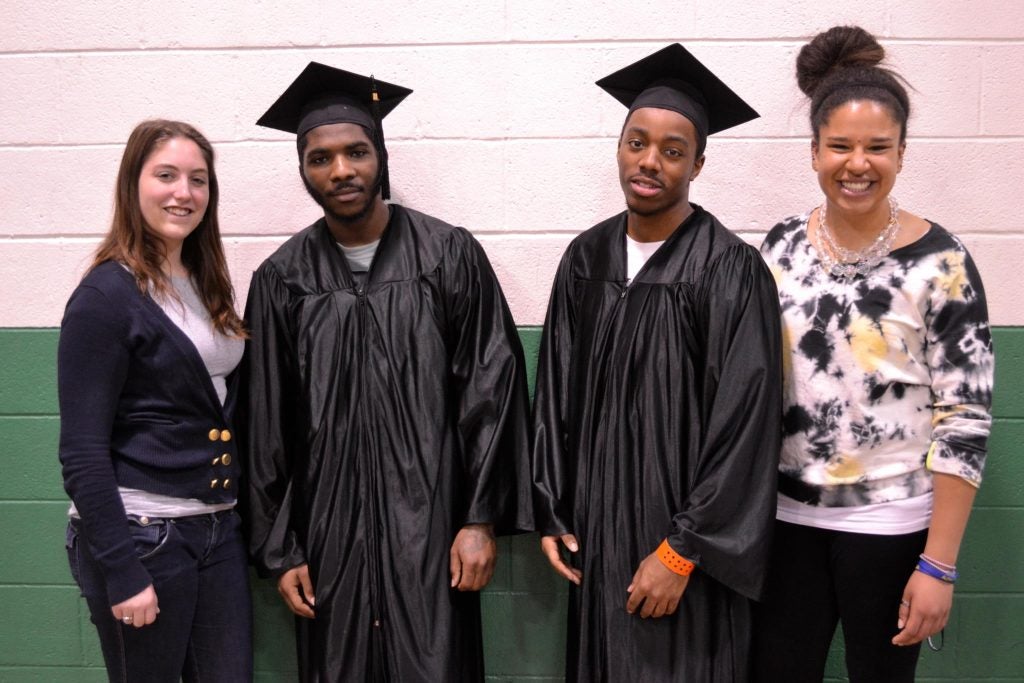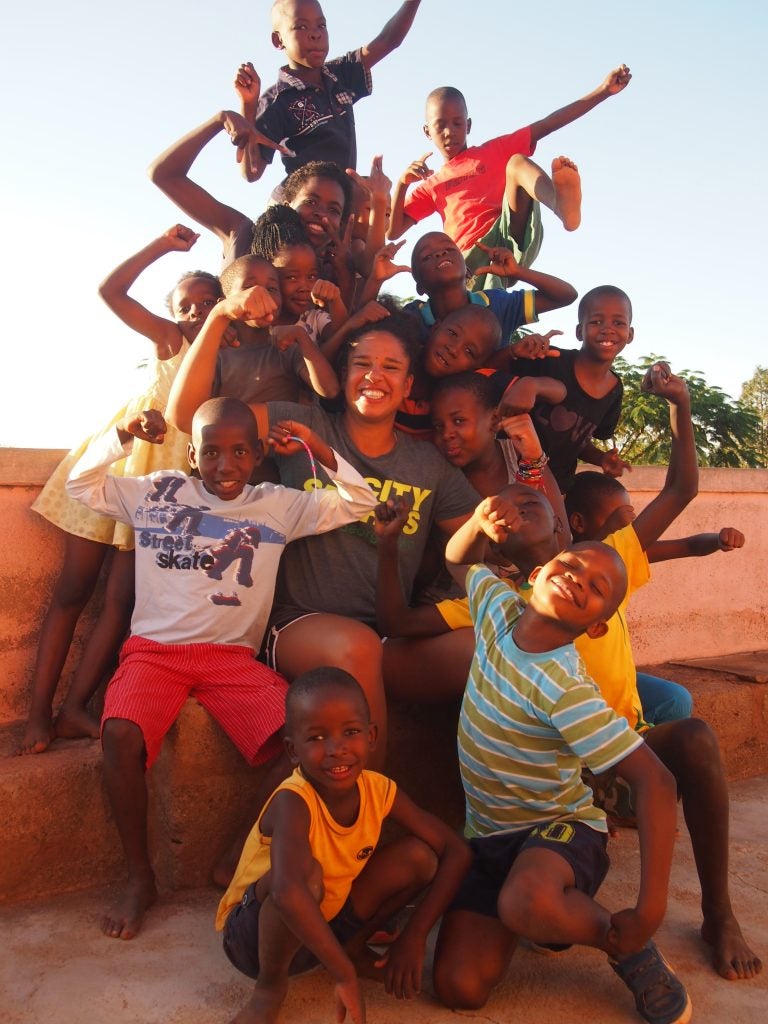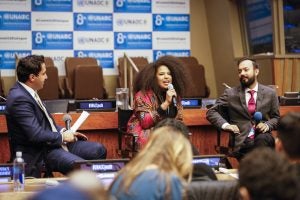
When Nicole Banister (SFS’13) graduated from the Walsh School of Foreign Service (SFS), the four years she spent in Washington, DC, at Georgetown were the longest she had lived in any one place. A self-described “third culture kid,” she grew up between California, Singapore, Texas and Louisiana.
Despite this wealth of international travel experience, Banister says that putting down roots at SFS didn’t feel like a tradeoff. “SFS offered this unparalleled opportunity to contemplate the world’s most pressing issues in the most globally-minded city in the United States,” she explains. “I had to be a part of that.”
During her time on the Hilltop, Banister built essential cross-cultural leadership skills that have empowered her to launch a wide-ranging career in international communications and development. From working with the Peace Corps and the United Nations to launching a dating and intimacy storytelling platform and an online course on how to adapt to new cultures, a passion for global social justice has motivated all of Banister’s endeavors.
Flexibility and Dynamism at SFS
When Banister committed to living in DC for four years, she was determined to take advantage of every opportunity the school had to offer. As a Culture and Politics (CULP) major, Banister enjoyed the flexibility of designing her own course of study. “Because I could tailor the concentration of my CULP major to what I was most passionate about, I could take courses across all four of the university’s undergraduate programs and still relate themes back to this deep SFS interest I had in dismantling global systems of injustice,” she says.

Banister recalls a range of courses on the U.S. criminal punishment system, educational equity and reproductive justice that expanded her knowledge of how to build a fairer and more prosperous world. The conversations she had at SFS, Banister says, laid the foundation for her career after the Hilltop.
“I’ve been able to leverage the critical dialogue that started in those classes with my SFS professors and peers to then identify real-life solutions throughout my career as an international development expert and content creator.“
Beyond the classroom, Banister was involved in a number of clubs and campus programming focused on social justice and community engagement. She says leadership roles with ESCAPE, Alpha Phi Omega and Prison Outreach (similar programs are run through Georgetown’s Prison and Justice Initiative) prepared her to “enter these spaces in community with people — leveraging our shared lived experiences to create change for people of color everywhere.”
Pursuing Global Social Impact
After graduation, Banister was ready to apply her academic and extracurricular experiences at SFS to a broader global community. “I wanted to make a difference,” she explains. “As cheesy as that may sound, I wanted to work side-by-side with leaders from various countries in order to amplify their existing assets and resources.”
With its two-year commitment to supporting economic and social development abroad, volunteering with the Peace Corps seemed like the perfect place to start. Banister served in South Africa teaching seventh, eighth and ninth graders and promoting healthy relationships and understandings of consent. She even decided to extend her service for a third year.

Her advice to SFS students considering the Peace Corps? “Get rid of any and all expectations that you have about your role as a Peace Corps Volunteer or the country where you’re placed,” Banister says. “Go in with an open mind and an eagerness to learn so that instead of projecting your own opinions of development, aid or successful programming onto your counterparts abroad, you in fact grow from the insights of the local community leaders who have been working in these places for decades before you and will be working there for decades after.”
A few years later, as a United Nations Alliance of Civilizations Fellow, Banister promoted a similar message of uplifting the existing efforts of local and marginalized communities. In this role, she traveled across the U.S., Spain, Morocco, Egypt and Qatar to facilitate intercultural and interfaith dialogue designed to counter hatred and intolerance.
“We must approach difference from a place of trust and tolerance instead of one of separation and superiority,” Banister says of her motivation for engaging with these initiatives. “You aren’t just born with cross-cultural capital — you have to cultivate it.”
“Connecting Dots and Connecting People”
Looking back on her time with the Peace Corps, Banister recalls her own journey toward deeper cross-cultural understanding.
“Serving as a Peace Corps Volunteer is very, very hard. And it’s not hard in the ways that most folks anticipate,” she explains. “You get used to living without running water, constant electricity shortages, waiting three hours on the side of the road for a taxi that may or may not even come. You adapt to that stuff.”
Rather, Banister says the most challenging part of experience was adapting to a new culture far from home. “What I think people don’t realize is that when you are immersed in an entirely new environment where nobody looks like you, nobody speaks the same language as you and nobody cares why you’re there until you prove yourself — you have to be really, really patient.”

Since she shifted from a career in international development to one centered on entertainment and storytelling, Banister has launched several projects to guide a wide audience through cultural and social transitions. From a celebrity interview series to her dating and intimacy platform, she strives to promote open dialogue and positive change.
As the latest online instructor for digital education startup Nas Academy, Banister ties together all of the threads of her career thus far: “international travel, critical dialogue about global social issues, promoting positive social norms and facilitating live with interesting people all over the world,” she says.
Launching at the end of October, How to Adapt to New Cultures strives to equip students with the cross-cultural communications to travel to new places and successfully pick up on new norms and conventions. As Banister describes it, the course is equally well-suited for career diplomats and travel bloggers.
“I hope that by sharing my lived experiences with everyone they, too, can strengthen their cross-cultural capital and communication tools to navigate any city, any country and any situation in the world,” she says. “I hope you step away from this course with a bit more empathy for those around you, and a bit more savvy to seamlessly navigate this dynamic and interculturally connected world.”
As she looks forward to imparting lessons in cultural communication to an online community of globetrotters, Banister sees her Nas Academy course as the latest step in a diverse career focused on furthering global social justice.
“The consistent theme across all of my career experiences has been connecting dots and connecting people, all for global social impact,” she says.